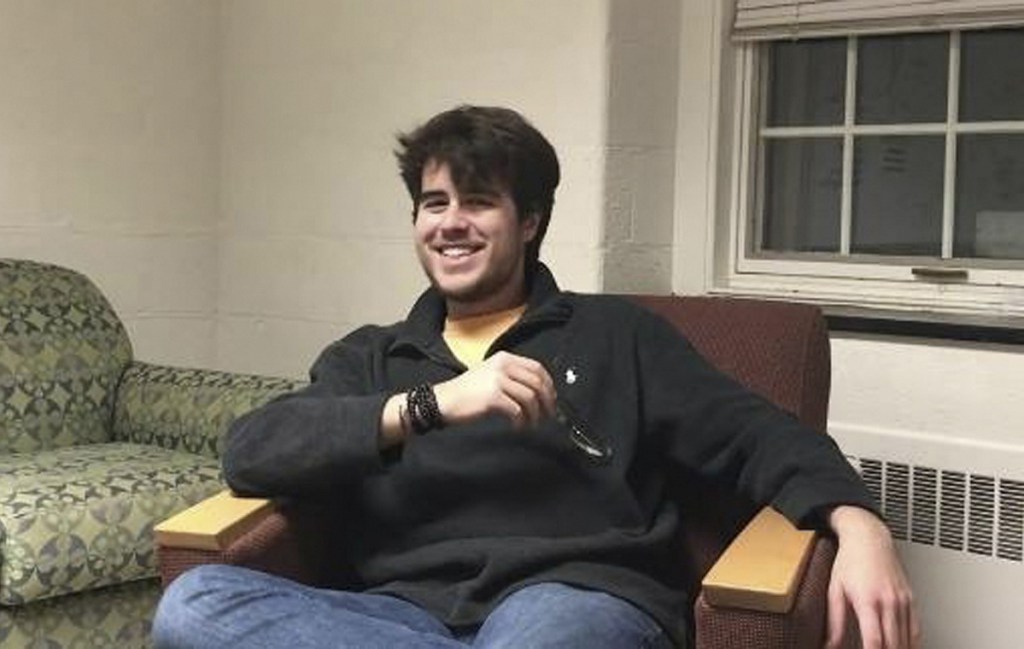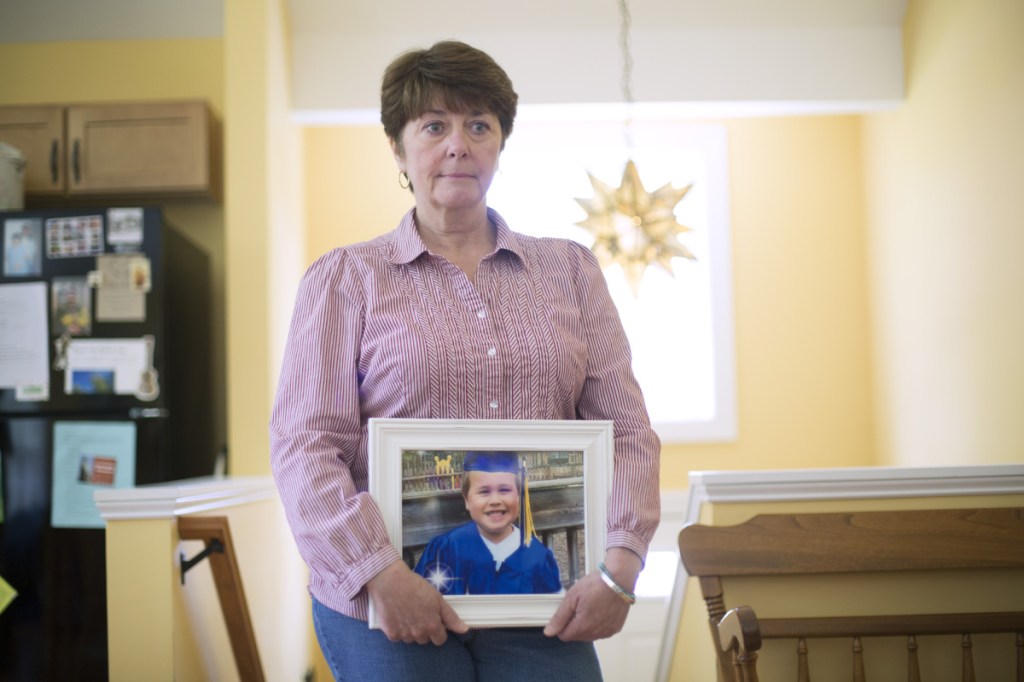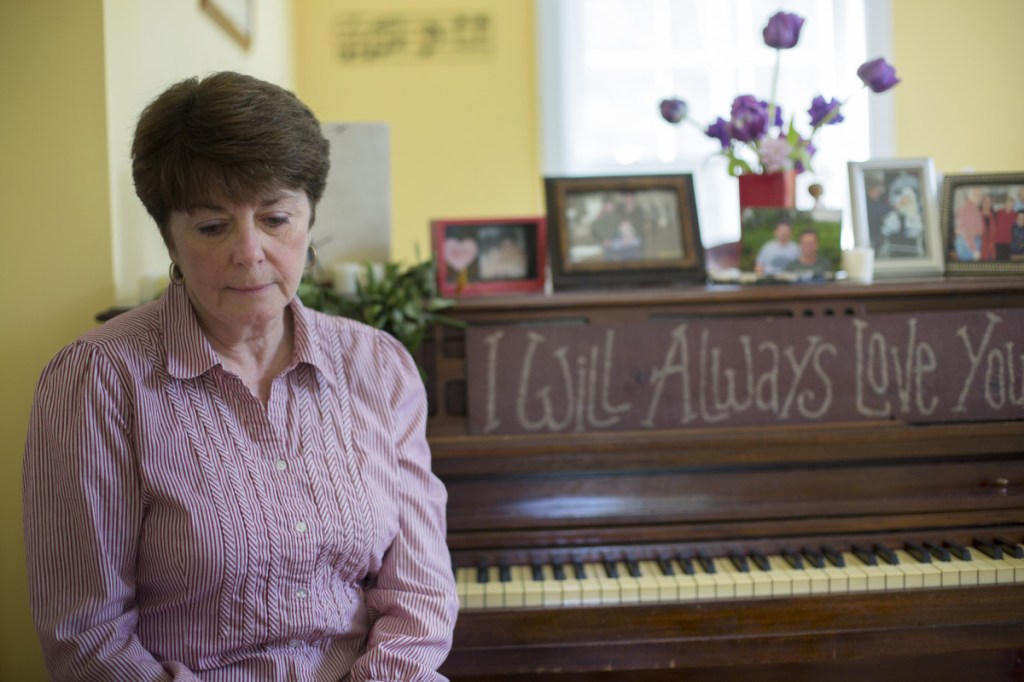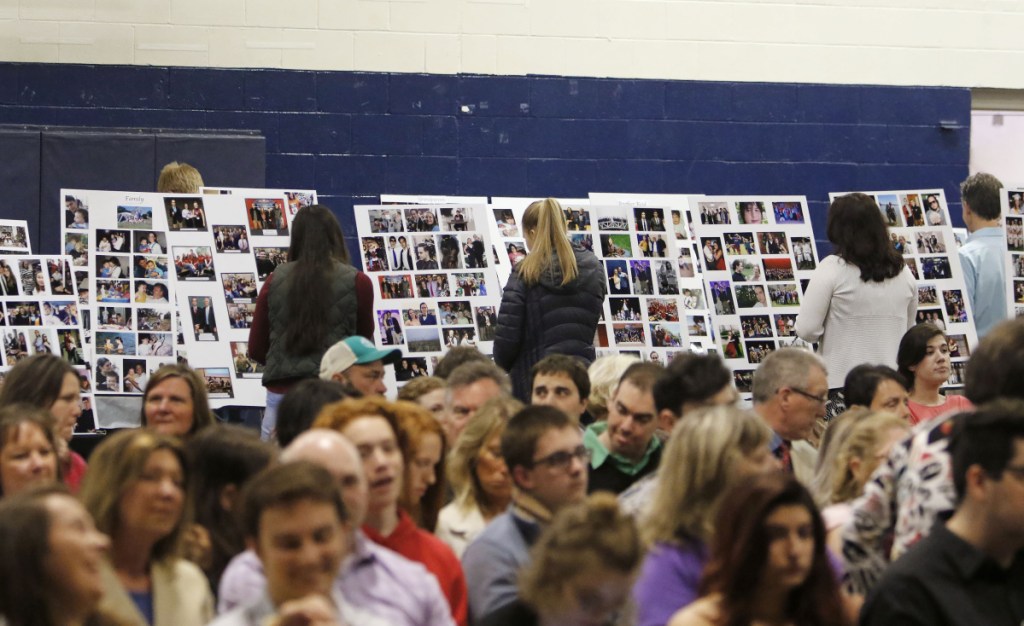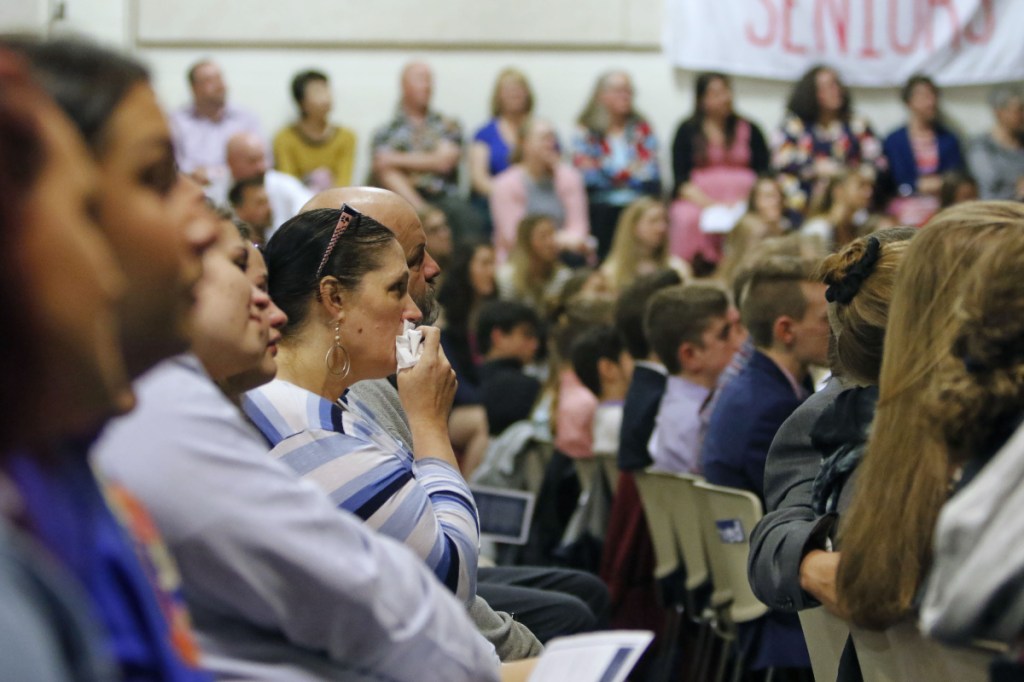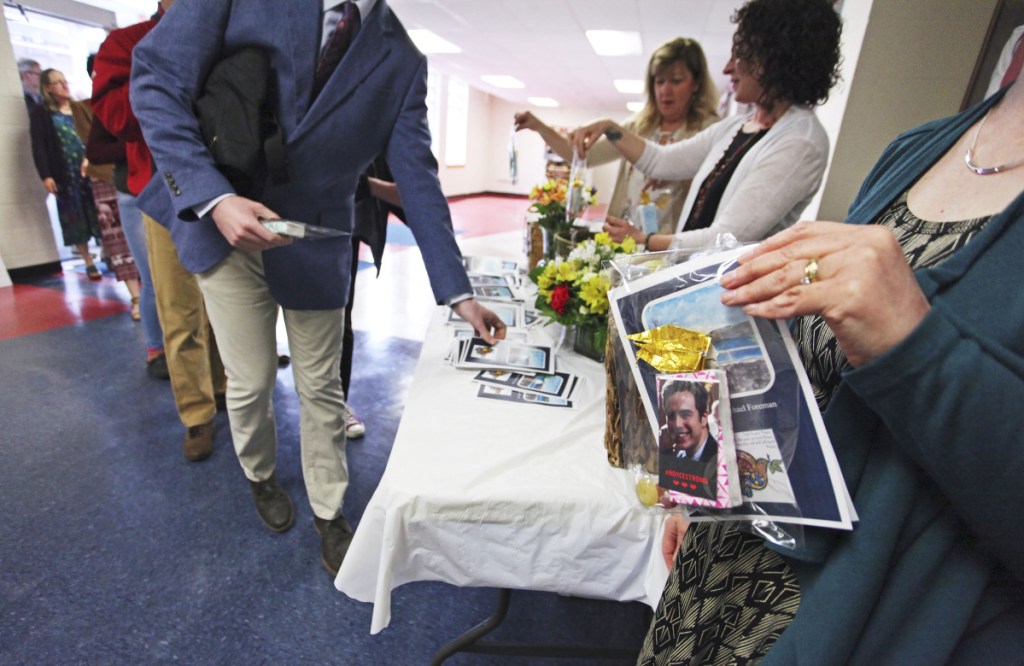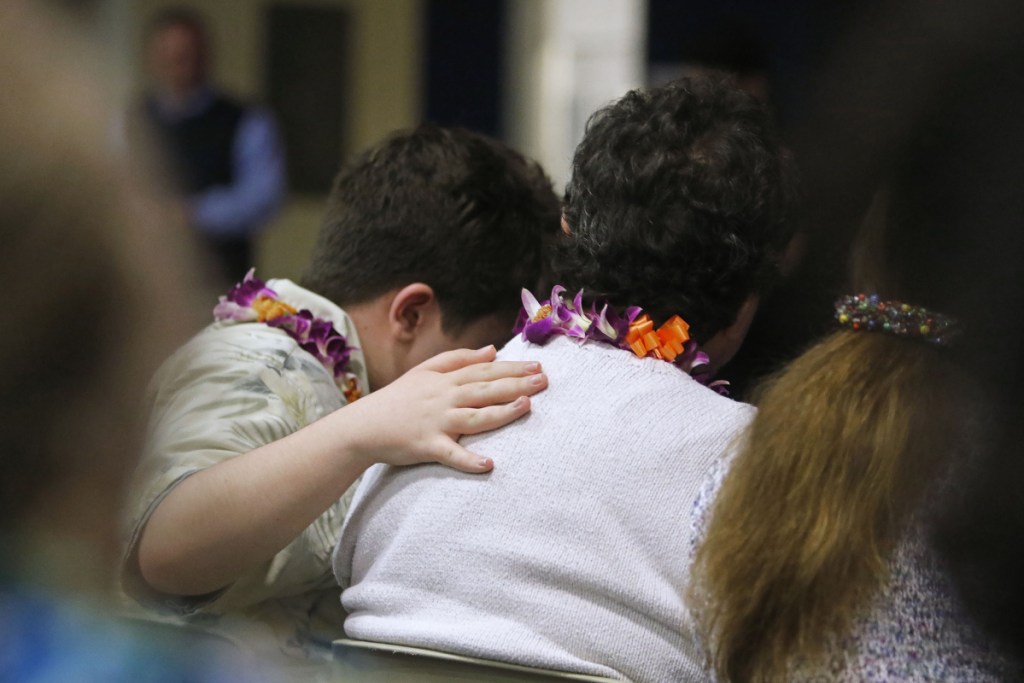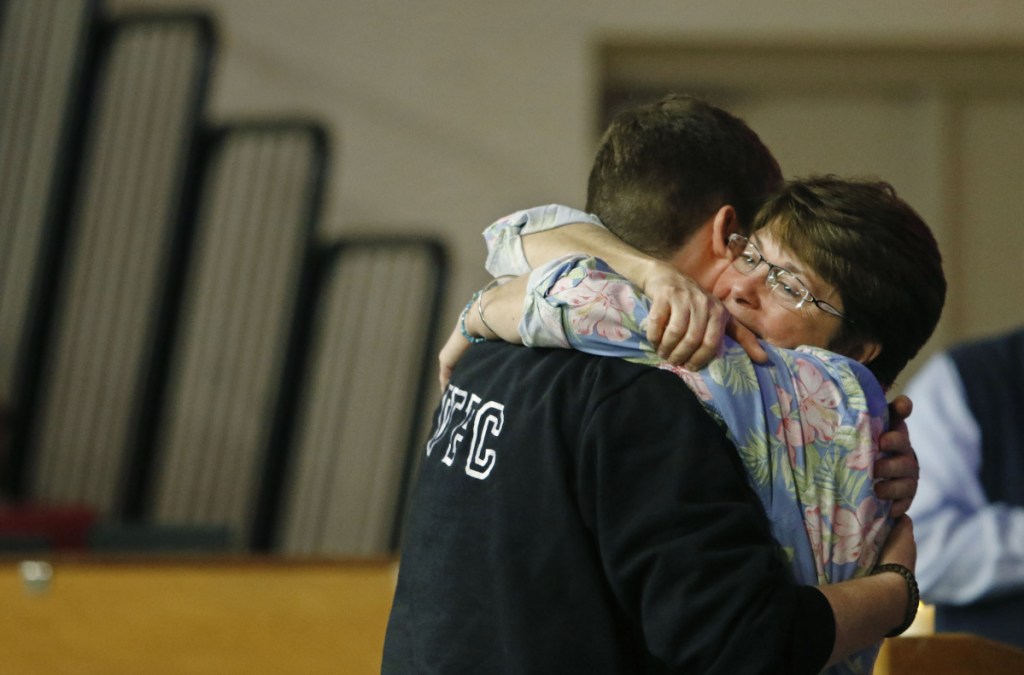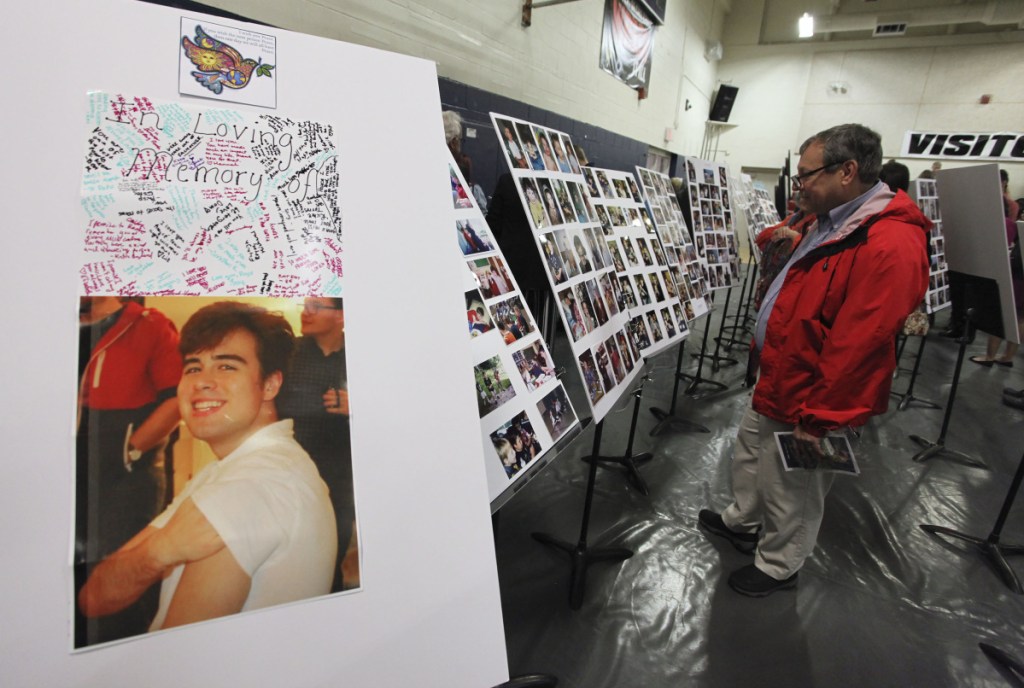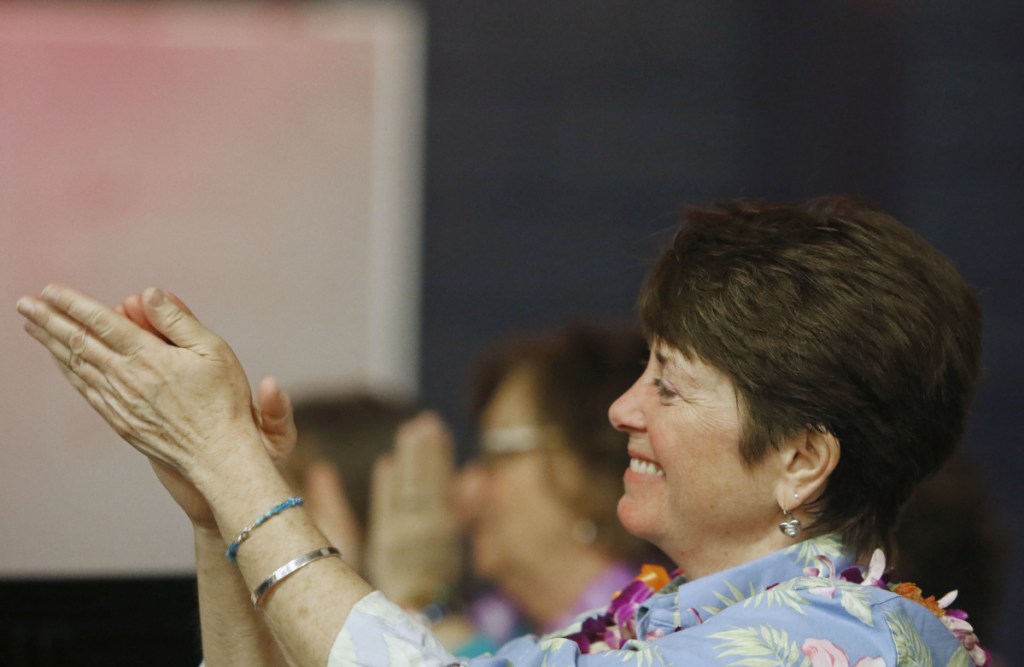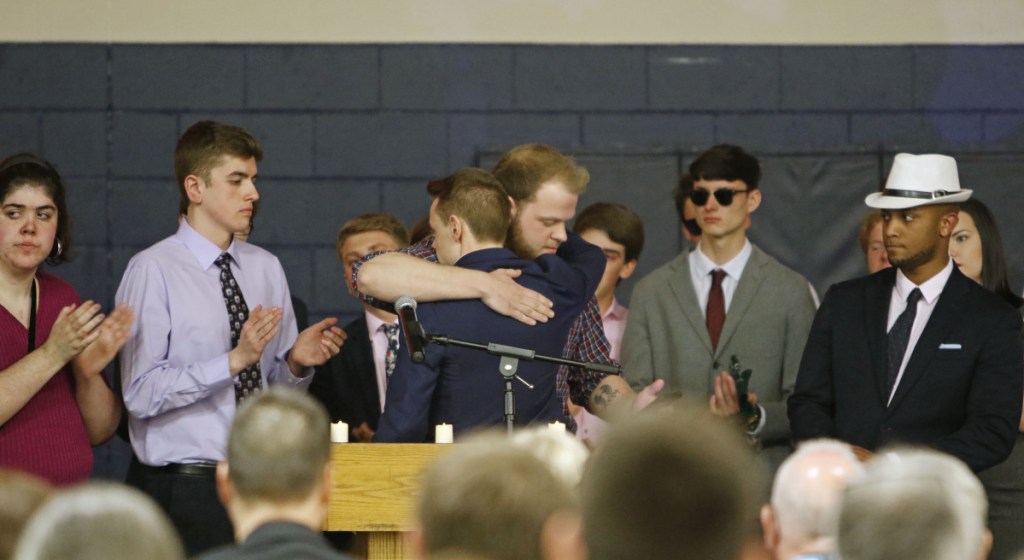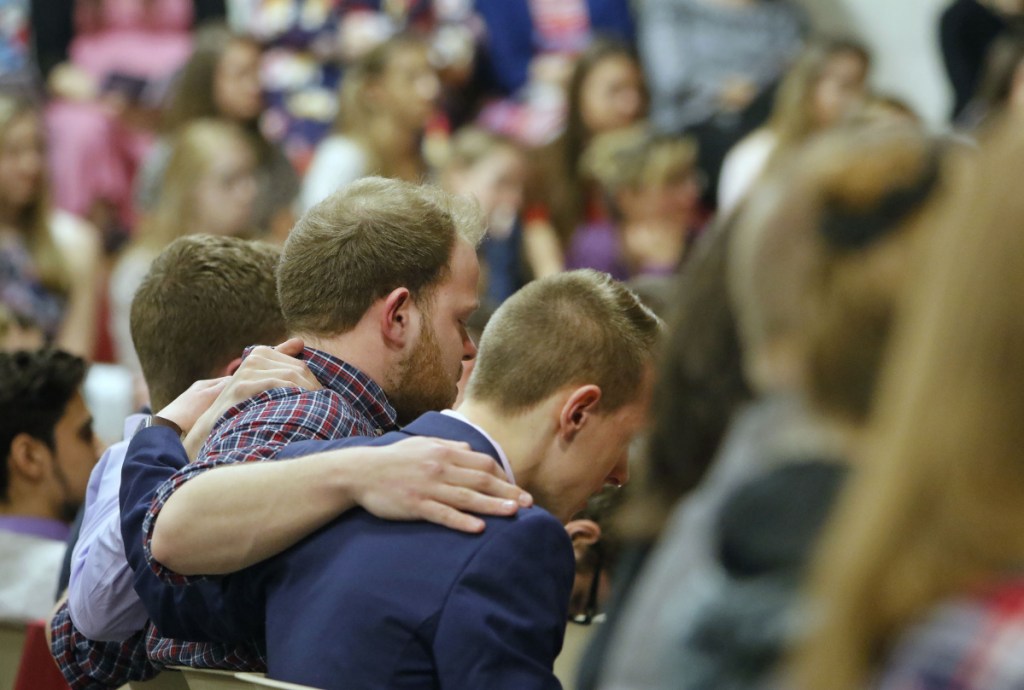Royce Foreman was the friend who broke tension and lightened moods, usually by making others laugh. The friend who always said yes to a ride to nowhere. The friend who fit seamlessly into any social group.
He could sing and play the piano and act. He was learning two languages and was eager to add a third. He seemed destined for big things.
In the early morning hours of March 30, Foreman texted his parents and younger brother.
“I’m sorry,” he wrote. “I love you.”
Two hours later, concerned classmates and campus police at Washington College in Maryland entered Foreman’s dorm room and found him unconscious. He had hanged himself.
He was taken by helicopter to a hospital an hour away in Newark, Delaware, but didn’t survive. He died on April 3, four months before his 19th birthday.
“I worried about him all his life, about all the things that could happen, all the things parents of teenagers worry about,” said his mother, Renee Conlogue, who lives in Gray, where Foreman was raised. “But, you know, I never worried about suicide. That never entered my mind. He had it all.”
In the days and weeks that have followed, Foreman’s family and friends – both at Washington College and back in Maine – are still struggling to understand why he chose to cut short his promising life. No one saw it coming. They also have a lot of questions about the circumstances surrounding his death that have not been answered, and the school has said little.
Foreman had been homesick, was struggling with some coursework and stretched thin with all the activities he was involved in, but those things are true of most first-year college students.
And he didn’t keep his struggles hidden, like some teens. He talked openly to friends and saw a counselor at school only days earlier. No one seemed concerned he would take drastic action.
“None of this makes any sense,” his mother said.
Now, Conlogue wonders if there was more.
Before his family could even pack up his belongings, she started hearing stories from classmates about the circumstances that led to his suicide.
FRATERNITY HAZING A POSSIBILITY
He was pledging a fraternity, Phi Kappa Sigma – which did not appear to have been officially recognized when he started – and there were hints he may have been subjected to hazing. Also, just hours before he decided to take his life, he was notified by the school in an email that he violated its honor code over a recent alcohol-related incident on campus.

Royce Foreman, 18, of Gray did not act as if he was considering suicide – he met openly with a counselor, and was driven and outgoing. The Maryland school where he was a freshman has little to say; his mother has a lawyer looking into the death.
Conlogue said she’s reluctant to share too many details publicly about what she’s learned, but she has hired a lawyer to look into her son’s death.
“Right now, we’re gathering facts about the circumstances that led to this desperate situation in his mind,” said attorney Steven Silverman of Baltimore. “He didn’t suffer from any mental illness prior to his first year at Washington College. What led him to this? What pressures was he under, above and beyond what is considered reasonable?”
Washington College has declined to answer questions about Foreman’s death or make anyone from the administration available for an interview.
“It is difficult to calculate or articulate the deep and indelible impact that a student’s death has on the entire Washington College family,” the school’s vice president of college relations and marketing, Rolando Irizarry, said in a statement. “We know this impact pales by comparison to the heartbreak and loss that Royce’s family is going through, and our thoughts are with them.”
The school’s interfraternity council, local fraternity members and the fraternity’s national chapter did not respond to requests for comment.
Most of Foreman’s friends are staying quiet, too, focusing instead on celebrating him.
“One of Royce’s most amazing qualities was his ability to talk to anyone and make everyone he interacted with feel so special,” said Shayla Bartoli, who met him during freshman orientation last fall. “I will never forget what one of his friends from home said: The amazing thing about Royce is that you could have known him for his entire life or only 15 minutes, and you would still feel like you have been friends forever.”
EARLY LOVE OF PERFORMING
Foreman chose Washington College, a small liberal arts school on Maryland’s Eastern Shore, for a few reasons. He wanted to leave Maine. He liked the school’s theater and business programs. And when he visited the school in April 2017, a month before his high school graduation, he was struck by its simple beauty.
Although he had a deep interest in a variety of cultures from an early age, Foreman was a country boy at heart, albeit one with a sense of style and a fondness for cologne.
A lot of college freshmen ease into campus life, but Foreman jumped into the deep end. That was his way. Conlogue said even as a boy, he had energy to spare.

Renee Conlogue at the piano belonging to her son, Royce Foreman, who died in April. He was a natural performer and caught the bug early at the Fiddlehead arts school in Gray. Staff photo by Derek Davis
He found music and performing early, largely through the Fiddlehead School of Arts and Sciences in his hometown.
Richie Torres was a senior when Foreman arrived last fall. He remembers seeing him in a play called “Yellow Face,” and marveled at his stage presence.
“Then I saw him on campus with his (L.L.) Bean Boots and his big Eskimo jacket and, I don’t know, I just wanted to be his friend,” Torres said. “So, I found him on Instagram and sent him a message.”
Friends found Foreman easily.
Bartoli said one of her first memories of Foreman was shortly after freshman orientation. A bunch of students were hanging out in a room with a piano. Foreman sat down and played “All of Me” by John Legend. Everyone in the room was wowed, she said.
“Our friendship flourished from there into something truly beautiful,” she said. “He would always come over just to chat about anything, and it made me feel so welcomed. Every little trip with him always seemed like an adventure.”
Emilie Sanborn grew up with him in Gray, but they didn’t become close until he attended the same college as she.
“He was always outgoing, always confident,” she said. “And he always asked about others. He wanted to make sure we were OK.”
Heather Calloway, Foreman’s academic adviser at Washington College, taught him in a first-year seminar and got to know him well. She said he seemed driven, even more than classmates.
“He was still trying to decide what path he wanted for himself, but he had really diverse interests,” she said.
He had performed in the theater program’s fall production and was set to appear in another play, “Stop Kiss,” the week he died. He was in the school’s Model United Nations club that had recently traveled to Panama.
But he was struggling, too. He had tried out for and made the school’s a cappella singing group but couldn’t make time for it. He was lagging in classwork, something that had come easily to him in high school. Fraternity demands, friends said, were weighing on him.
“You never really know what people are going through,” Torres said. “I thought I knew.”
“He was definitely stressed,” Sanborn added. “But it seemed like something he could manage.”
The pressure Foreman felt is not unique among college students.
Ben Locke, who founded the Center for Collegiate Mental Health at Penn State, said the number of students who have been utilizing counseling services has increased by 30 to 40 percent on average in five years, while college enrollment has increased by just 5 percent.
The reasons for the increase are not easily explained. No two cases are the same. And most who do seek counseling don’t choose suicide. Although suicide has been increasing on college campuses since the 1950s, the rate remains lower than in all other age groups.
“That’s why it’s such a shock for families who lose someone to suicide who showed no signs that was something they considered,” Locke said.
SON’S PARTING TEXT MESSAGE
Conlogue last spoke to her son on March 26. He told her he was concerned about a quiz he had just taken and was busy with play rehearsal but was otherwise OK.
They messaged back and forth the next two days. The quiz went better than expected. He had gone to counseling on Tuesday. He was managing.
Sanborn talked with Foreman the week of his death. In fact, two days earlier they had pulled an all-nighter. They talked about a lot of things, she said. He was feeling stressed but not overly so. They both missed home and talked about making a surprise trip back to Maine in mid-April.
He had been at rehearsal for the play Thursday, March 29, when the email came in about the honor board violation.
Conlogue hasn’t seen the email but has talked to friends who discussed it with him.

Reid Foreman, 14, and his father, Royce Sr., wear leis during a celebration of Foreman’s life on April 29 at at Gray-New Gloucester High School. The celebration drew huge crowds.
“Clearly, he thought his life was over,” she said.
Bartoli spoke with Foreman that night, after the email hit his inbox. Although she declined to speak about it in detail, she was on the phone with him and standing outside his dorm while he was inside. She had been trying to get him to let her in or come down. When he wasn’t saying anything, Bartoli knew something was wrong.
Conlogue got her son’s final text message at 1:44 a.m. on March 30. She woke up a little confused but not alarmed. She messaged back, “Hey bubba. What’s up?” He didn’t respond.
“I didn’t think anything of it,” she said. “Now, I’m beating myself up. Why didn’t I call him?”
Sanborn says Foreman had asked her to get together the night before and she was busy. She feels guilty, too, for not being there.
“I think about what I could have done to be a better friend,” she said.
After Foreman was found, the classmates who entered performed CPR until an ambulance arrived. He was rushed to a hospital.
Conlogue and her ex-husband, also named Royce Foreman, traveled south immediately when they learned what happened. Their son’s heart was still beating, but he had suffered significant brain damage from oxygen loss.
Their younger son, Reid, who is 14, joined them two days later. They held their son’s hand and kissed him. Before he passed, doctors were able to harvest his organs. Even in death, he helped others.
Back at his dorm room, police had found a note, which Conlogue shared. Most of the words were so emotionally detached, she said. They didn’t sound like her son at all.
He ended it by apologizing to all those who “believed in him.”
FAMILY HOPES LAWYER LEARNS MORE
Conlogue has learned a lot about her son in the weeks following his death and it has left her with more questions.
The case is still under investigation by the local police department in Chestertown, Maryland, but it’s not exactly active. Police Chief Adrian Baker said detectives are only waiting for the final toxicology report.
Conlogue said she hasn’t seen any initiative from local police, or from the college, to get to the bottom of what happened. That’s one of the reasons she hired a lawyer.
If the college is conducting its own internal review of Foreman’s death, that hasn’t been made public.
The hospital did a toxicology screen before he died to test his body for drugs. That was negative. He had no history of mental health or substance abuse issues.
But he was exposed to new things in college, like all kids. Hard liquor. Even illicit drugs.
Conlogue has learned more about his fraternity activities as well. He told her he was pledging the fraternity as early as Feb. 3, but it wasn’t until mid-March that the chapter was officially reinstated by the college, according to a story in the student newspaper, The Elm. Had Royce pledged to an unsanctioned fraternity?
The school won’t say.
Conlogue also has been disturbed by the things he may have been asked to do as part of his pledging. She withheld specifics because she doesn’t know how much is true.
Her son had seen his counselor that week. She wonders if there were any obvious warning signs from that session that were not heeded.
Locke, the collegiate mental health expert at Penn State, said the side effect of more students seeking counseling services on campus is that most colleges are not equipped to handle the increase. That means students may not be getting the help or treatment they need.
“This massive growth is forcing counseling centers to act more as ERs than doctors’ offices,” he said.
College President Kurt Landgraf told the campus paper last month that the school followed protocol for handling Foreman’s suicide but declined to elaborate, citing the Family Educational Rights and Privacy Act, which protects student records.
“President Landgraf and his team have been very supportive since the incident and have been working diligently to learn and improve as we can only hope to create a positive change on this campus,” said Bartoli, Foreman’s friend and classmate.
This isn’t the first time Washington College has dealt with suicide.
Three years earlier, another student, Jacob Marberger, took his life. He was a lot like Foreman: smart, driven, interested in theater and involved with a fraternity. He, too, had been disciplined by the school shortly before taking his life and his father later said that the young man had been bullied.
Marberger’s death generated much more media coverage. He was suspended for brandishing an antique gun while drunk at a party and when he returned was kicked out of his fraternity and forced to step down from his position in student government.
Less than a month later, he drove to the Hawk Mountain Sanctuary about an hour and a half outside Philadelphia and killed himself.
Torres, the student who became friends with Foreman after seeing his stage performance, was also friends with Marberger. He’s said it’s strange to think he’s had two close friends end their lives.
“I should be going to honor ceremonies, not funerals,” he said.
Torres and others have been part of a student-led effort to push for changes at the school following Foreman’s death – changes to public safety response protocol, changes to how students are notified about honor code violations and even changes to how the school treats students in mental health crises.
“As students, we have the voice. We have the power to change things,” he said.
Conlogue has been amazed by the support of her son’s classmates so far. She hopes, as more information comes out, further action might be taken.
On April 27, two days before her son’s celebration of life, Conlogue struggled with what she would say. She knew there would be a lot of people there. She knew the audience would be captive. It needed to be meaningful.

Visitors line up to view photo boards at the celebration of Royce Foreman’s life at Gray-New Gloucester High School in Gray on April 29.
When the day came, it seemed like the whole town was there, packed into bleachers and chairs lining the floor of the Gray-New Gloucester High School gymnasium. A bus of about 30 Washington College students made the trip as well.
There were more than three dozen boards filled with photos of Royce and his friends. Many in attendance shunned black in favor of bright colors. Some wore Hawaiian shirts.
‘HE PUSHED US TO LOVE’
In the pictures and the video tributes and the memories of friends, Foreman seemed like someone who was comfortable and confident in his own skin. The stories they shared didn’t square with someone who would cut short his life.
“He pushed us to love as freely and openly as we could. I’ll miss his character,” said one friend, Nick McCann.
“He had an amazing ability to make you laugh,” added Isaac Godsoe. “He was the happiest guy I knew.”

Friends comfort one another during the celebration of Royce Foreman’s life.
Phoebe Stritch told a story about going fishing with Foreman in high school. They weren’t having much luck and on one cast, the girl’s lure got stuck.
“He took off his shorts and got in the water,” she said. “He knew it belonged to my sister and that she’d be mad if I didn’t come back with it. I was ready to cut the line.”
Sanborn said Foreman once told her when she was having a rough time about something, “You’re not alone.”
She wishes he knew that.
Toward the end of the event, Foreman’s father, Royce Foreman Sr., stood in front of the crowd and thanked everyone for coming.
“This is his stage,” he said. “My heart used to just balloon up when I saw him on stage.”
“When he came into the world, he gave me life, not the other way around,” the father said.
The older Foreman said later that he’s been trying to move forward. He has thoughts and questions, too, but doesn’t know if any answers will ever come.
He’s been struck by the kindness and generosity of his son’s friends in the weeks since he died.
“I’d love to have him back though,” he said through tears.
Conlogue spoke last.
“He didn’t make this decision because he didn’t love all of us,” she said, as much to herself as everyone in the room. She urged people to go in peace, to be mindful of their interactions with others and, above all, to be kind.
When families talk about suicide, it often does more to reduce stigma and bring awareness than anything.
“Surviving families now are creating enterprises to carry on names in that cause. That was unheard of 50 years ago,” said Locke, the mental health expert.
Foreman’s family will be one of the latest. They have established a scholarship in his name, the Royce Foreman Memorial Scholarship. The first benefit will be held on June 3 at Spring Meadows Golf Club in Gray.
There will, of course, be music.
Eric Russell can be contacted at 791-6344 or at:
Twitter: PPHEricRussell
Copy the Story LinkComments are not available on this story.
Send questions/comments to the editors.


